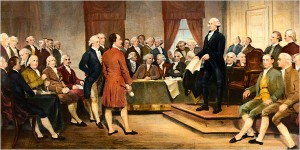 An article courtesy of Res Pulbica in reponse to an earlier post Two Centuries, One Score, One Decade and a Half Ago….
An article courtesy of Res Pulbica in reponse to an earlier post Two Centuries, One Score, One Decade and a Half Ago….
“I have but one lamp by which my feet are guided, and that is the lamp of experience. I know no way of judging of the future but by the past.” Patrick Henry
People often assume that our Founding Fathers offer nothing in the way of guidance in dealing with contemporary issues. Such is the case in post on this website offered today. As the commentator notes, “More than likely, our founding fathers did not have a stance on these issues as they did not exist. Our forefathers could have never imagined the world we live in today. The technology, greed, anger and even stupidity that subsist present day could not be matched 235 years ago.” I beg to differ.
Of course, the people of the past have no idea what the future holds anymore than we will know what our country will be like 235 years from now. While the Founders could not have made comments on particulars, they certainly can, and do, speak to us now. They do so because the issues we deal with today are the same issues they dealt with. The particulars are different but the principles endure. As I mentioned in my last posts, the Founders bequeathed to us the truism that liberty and power are opposites; to wield power is to deny liberty and to have liberty is for government to lack power. With this core principle, which is as old as Western Civilization, we know how the founders would have generally reacted to our contemporary situations.
So, let’s examine some of the issues our commentator believes supposedly “too complex” for our founders and see how the lamp of experience might guide us.
1: Dumping millions of gallons of oil into such a pristine body of water such as the Gulf of
Mexico. First, colonial, and then state, government, just like today, enacted laws that prohibited the willful destruction of both public and private property. The principle behind these laws formed the English Common Law system that our nation inherited. While the devastation in the Gulf was terrible and probably unprecedented, the founders would have responded by enforcing the very laws they enacted to punish this behavior.
2: Thousands of babies being born daily to crack whores and without father . . . but there has to be programs in place to assist those in need with things such as healthcare, food and shelter.
This first part is a plague of modern society and it is one of our own making. The Founders believed the federal government had no role to play in this because this was a local and state issue. Hence, there was no need for federal intervention into this issue. That said, they had experiences with these sorts of things (sadly). Practically every state and locality had various ordinances and policies on how to handle delinquent parents and truly abusive parents. The notion of “wards of the state” is not a new one to us. It is an old English tradition (at the local town level) that came over with the Mayflower. Local towns, Churches, and charities often assisted single mothers and/or alcohol or drugs abusers (yes, drugs. Opium and Ludlum addicition were a major problems).
The founders did not believe this was the responsibility of the federal government. Rather, it was the business of state and local government. Each state and local government enforced what were known as “poor laws.” These measures, having predecessors in England, provided necessities for the poorest of people or those that were unable to care for themselves. Because they were not at the federal level, they could address the particular problems of individual rather than a uniform and wasteful system that our current systems operates. So, when our commentator asks, “How do you get rid of these programs when all it will really do is hurt those who need it most?” he is establishing a strawman. There is no need to be rid of these programs – they have existed since before our nation’s birth – but there is a need to administer them better. The federal government cannot do this; the rampant waste and abuse demonstrate this. But if we remember that our founders bequeathed us a federal system, we can then use State and local governments to administer these programs. They, not the federal government, know the real need of their people better. At the local level, it is easier to know who is in real need and who is merely abusing the system.
But more importantly, the founders believed that non-governmental institutes bore the real responsibility for caring for sick and poor; they believed Churches and charities should do this. And these institutions did. In fact, from the founding of our nation to the 1930s, Churches and charities administered more aid to the needy than state and towns did in poor laws. Unlike the federal government of today, there were no strings attached. This aid was given out of Christian love and it was given to believers and non-believers alike. In the nineteenth century, Churches and charities helped so many needy people that many observers called the United States a “the Benevolent Empire.” Imagine if we kept our government limited in nature and thus much lower in taxation, how much more our Churches and charities could do today because we keep more of our own money and can distribute it in a manner individual’s best see fit?
3: Companies blasting steroids and other harmful additives into chicken, beef and pork to enhance flavor and help the growing process so they can be harvested more rapidly to meet demand. The Founders believed in an open market, where various companies could produce its products and the people themselves decide what they would purchase. This is a key element of liberty; personal choice. If an individual does not want to consume these additives and steroids, that is their choice. They have options to buy free-range meets or to raise their own. Again, because the Founders believed in personal liberty, they would not have forced corporations to stop these practices; options exist that allow the individual to avoid those products. It was (and is) not the role of government to make these decisions for people.
4: The daily threat of being blown away in this great nation we call the United States of America by some terrorist who is upset with our way of life and is willing to kill himself as long as he can take a few of us rotten Americans with him. This is the easiest to answer. When the Founders encountered a true enemy, who threatened, maimed, and killed Americans, they responded by attacking and destroying those enemies. In 1794, Indians in the Northwest Territories were defeated in the Battle of Fallen Timbers thereby ending the threat they posed. In 1801-1809 the United States destroyed the Barbary Pirates. These Muslim Terrorist often kidnapped and murdered Americans (as well as other Europeans) both in the name of Allah and greed. Like most countries, the United States paid the Pirates a tribute. But, after increasing atrocities, President Jefferson and Madison dispatched the Navy and Maries, and at the Battle of Triopoli, and several other pitched battles, we destroyed them. After 1811, the Barbary Pirates were never a threat to the United States or anyone else. What lesson can we learn from the Founders? Destroy the enemy; use all available resources to do so.
5: Our commentator also mentioned several other items, such as pyramid schemes and notes that the Founders had no idea about such great “complexities.” That is simply not true. The Founders were very familiar with frauds of all sorts – even if those frauds lacked the fancy nicknames like “pyramid” and “ponzi.” Among the first major pieces of legislation in our nation’s history was the “Statue of Frauds,” which penalized fraudulent behavior. Also, several of our founders ran speculating schemes identical to pyramid schemes. James Wilson, the 2nd appointment to the Federal Supreme Court ran a land speculation scheme exactly like that of a ponzi scheme. When he it was realized and creditor and debtors became to call in their loans and question what had happened, Wilson fled. He died in a debtors prison, facing charges of fraud. Robert Morris, known as the “Financier of the Revolution,” engaged in a similar scheme in the 1790s and met a fate similar to Wilsons. In 1793, the entire Legislature (to a person) of the State of Georgia was bribed by the Yazoo Land Company in order for that Land Company to obtain the land of what is modern day Alabama AND Mississippi. When the people of Georgia realized this, they voted out the entire legislature. It seems that the Founders were indeed familiar with our modern “complexities.”
6: The Housing Crisis. Of course, a large part of the housing crisis was caused by our attempt to live beyond our means. In large part, though, this was made all the easier because of government schemes and regulations. Freddie and Fannie are government created entities. In 1978, and again in the 1990s, the government mandated that both institutions begin offering loans to lower income families at artificially reduced rates. On top of this, the government began pushing home owner ship for lower income families. The result was an artificial, government created market that did not reflect the realities of a real market system. When that artifice began to crumble, it took with it the entire system. The reason for this is that government had secured these poisonous loans meaning that companies that purchased them knew the federal government backed and secured the loans. This does not leave those companies blameless, of course, but imagine what would have happened had government remained limited and confined as our founders intended? False markets based on false promises would not have occurred and perhaps avoided this whole crisis.
In this hasty reply, I hope I have demonstrated that our founders were quite familiar with issues we assume to be new to us, or too complex for their supposedly simpler times. While some of the details are the quite different, the core principles remain. What appears the most radically different is that we expect government answer all our answers rather than take responsibilities for ourselves. Of course, this is just further proof that we are not a people with liberty.
I conclude my response to our commentator with two disturbing comments made by the author. First, he equates not wanting to be forced on pain of law to do something – such as purchasing health insurance or paying into a system that is crumbling or paying higher taxes to support government waste – as a symbol of selfishness? How is that so? How is it inherently selfish to not want to be forced to do something or contribute to something that you know if broken and false? But most disturbing was this statement: most people need to be saved from themselves. This implies that self-government is impossible, unworkable, and, in the end, that people are simply too stupid to make their own choices and face those consequences, all of which requires a stronger government far removed from the people.
But if the people cannot govern themselves, who, pray tell, will save us from government?
Res Publica







This article or response to an article is what I believe the “right” or “Tea-Party/Libertarians” don’t seem top get or understand about the left/Liberals/Progressives. Like many of the historic items the writer describes here, we’ve seen all this before and should learn from our own history and mistakes.
Point 1.- The oil dumped in the ocean of the Gulf Coast was in U.S. national waters not local or sate waters until they came to land.Sonce these companies work in these waters they are subject to Federal Law not state or local unless it effects the states own borders. Another example could be the National border with Mexico. The Federal Governments appointed job is to protect the borders similar to the it’s purpose to protect the coast from enemies foreign and domestic. While BP may not be a foreign enemy they did violate Federal law in Federally regulated waters. This is obviously within the Federal realm and even state and local realms when it reached shore.
Point 2. The writer is making a religious point about helping the poor with blind ignorance toward what many Americans believe and that is that there should be a separation of church and state. I would not want to depend on an entity I do not agree with to help me if I were in dire straights. While I do not believe the Federal Government should run a welfare state, I do believe it is their job according to the Constitution to “promote the general welfare.” The systems put in place to aid the poor and helpless do just that and is well within the federal governments powers to do according to our own preamble. The local aspect in this is that the states administer Medicaid and Medicare not the Federal Government. They simply dole out the money via the administration on the Federal level.
Point 4. I agree a bit here but I believe the writer still misses a point that could have been made. While individual freedom to choose products should be left up to the consumer the consumer should also be guaranteed protects from dangerous and faulty products. Companies will routinely do whatever it takes to increase profits even if it means hiding behind sketchy science to do so. Anyone can tell you hormones and antibiotics can do harm to the human body in the long run. Many studies show girls are starting their periods earlier due to these same hormones. The consumer should be promised certain protections while shopping around. Buyer beware should only be an acronym when we don’t know enough info to prove a product is or isn’t dangerous. If left to local and state governments there would be a spotty set of laws that does no one any good hence the governments ability to regulate interstate commerce as affirmed by the Constitution and multiple Supreme Court Rulings. AS far as the latest Healthcare law. The federal government once again is permitted under the Constitution to regulate interstate commerce. But wait the catch here is if we are being made to buy a product when we aren’t using it then how is that commerce. Well, your breathing right? Your eventually going to need some form of healthcare. Your eventually going to get sick. Not too mention if you don’t have insurance your going to pass you inability to pay your bills due to their high cost onto those who do have insurance. So there the “inactivity” argument is hogwash. The truth is you will at some point take part in the healthcare system and therefore should be required to carry insurance to aid in paying your part until such time that healthcare is universal and not a profit driven industry but an inherent right for all Americans.
Point 5. Our overreaching overseas policies after WWII have lead us to today’s out-of-control threats. We Created a country, aka Isreal in the middle of another and expected there to be peace. This combined with our over seas bases lead to increased hostilities in the region thus leading to retaliation. While I do not in any way CONDONE the attacks on embassies, ships and 9/11 I do believe we made the first strike. Our foreign policies towards the Middle East must change in order to garner peace! As far as the Madoff issue is concerned. This man violated the law not only of New York but of the Federal Government as well. The Stock Exchange is an INTERNATIONALLY traded exchange and across state borders. Since this is commerce it falls within the jurisdiction of the Federal Government. Remember the Federal Government is the SUPREME LAND OF THE LAND according to the Constitution.
Point 6. On this point I agree but unlike the writer I would spread the blame here a bit and say that greed is what caused the crash. Fannie and Freddie were created by the Federal Government but were independent entities until they were taken over in 08. The availability of cheap loans or easy money was key. However banks grew greedy and allowed home owners to take out loans on homes they could not afford because they wanted the money from the interest. Homebuyers got greedy and wanted the biggest possible home for the least amount of money down and the least amount of payment. In the end they doomed themselves by taking out variable rate loans and by biting off more than they could chew. The real kicker is how the free market system handled these loans. Banks like Goldman’s begin packaging/bundling them together and selling them as AAA (via Moody,s and the Standard and Poor’s) graded derivatives. They then bet against them via insurance, remember AIG, because they new what was coming. Greed blew up the market in 08. The Federal Government tried to do something good for the American people and greed set in on both sides.
My last point is that no system is perfect and it will always need adjustments. So things like Social Security and Medicare are systems that do what they were intended to do. Social Security as a matter of fact has been running in the black except for the money the Federal Government started taking out of it beginning with Reagan. it’s easy to say a system is going to go bankrupt when you rob it off it’s income. I do not believe the people need to be saved from themselves. I have more faith in human nature than that. But I do believe the average American does need help from time to time and especially when it comes to the greed that reigns on Wall Street.
So if people do not need saved from themselves, why do we have drug and alcohol rehab centers, credit card consolidation services, or even an electoral college in place to elect a president? Most people make good responsible choices, but there are more than should be that do not. Just imagine if the electoral college was not in place, we may not even be having these debates because the right guy would have won in 2000 seeing as he got more of the popular vote. Hmmm, you may be onto something about letting people decide for themselves.